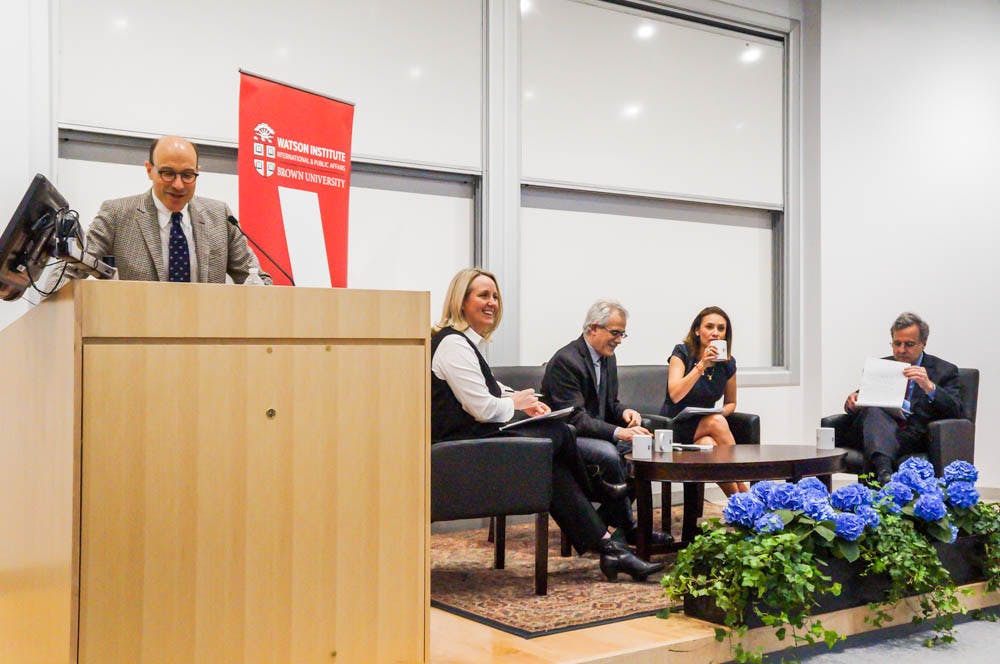After losing control of the executive and legislative branches of government following the 2016 election, Democrats are left pondering the future of the party.
David Corn ’81 P’21, political commentator and Washington bureau chief for Mother Jones, moderated a discussion on the future of the Democratic Party Tuesday, analyzing the party’s shortcomings in the wake of its defeat this past November. Maria Kumar, founding president and CEO of Voto Latino, a nonpartisan political organizing group for Latinos, Bill Samuel, national director of government affairs at the American Federation of Labor and Congress of Industrial Organizations, the largest federation of unions in the country and Stephanie Schriock, president of EMILY’s List, a political committee supportive of pro-choice women seeking office, joined together to panel the event, “The Future of the Democratic Party.”
The event was the culmination of a seminar series that was planned prior to the 2016 United States presidential election, said Edward Steinfeld, director of the Watson Institute for International and Public Affairs, a co-sponsor of the event. The event was also sponsored by the Taubman Center for American Politics and Policy, the Brown Democrats and the Brown College Republicans.
In order to advance the Democratic Party, panelists said, former Democratic presidential candidate Hillary Clinton’s campaign failures should serve as an example for future campaigns, drawing attention to broader flaws within the party. The panelists critiqued Clinton’s campaign strategy, which they said failed to attract union, minority and women voters.
“Hillary Clinton did rather well, but not as good as (former President) Barack Obama, and that’s really the story,” Samuel said, adding that it was her loss, not Trump’s success, which eventually led to his surprise victory.
Clinton’s economic message was ultimately unsuccessful in attracting the “downscale voters, those earning $15,000 or less,” Samuel said. Along with her ineffective economic message, Clinton’s failure to critique Obama’s economic policies — regardless of the fiscal climate he inherited — hurt Clinton’s campaign, pushing many Americans into Trump’s arms, he added.
Kumar concurred with Samuel on Clinton’s flawed outreach strategies, adding that the demographic shift in the Latino community could have made Clinton the first female president had she not ignored that community.
“We keep hearing that not enough Latinos (came out),” yet “Latinos are the only population that grew as an electoral base this year,” Kumar said. Additionally, 54 percent of Latinos voted early, part of an early-voting trend that had never been seen before, Kumar said, adding that this was true despite the fact that most polling booths were in locations scarcely populated by the Latino community.
“Texas was ripe to turn blue and was not part of the battleground strategy,” she added.
Schriock also critiqued Clinton’s lack of minority engagement, as women of color comprise the backbone of the party, she said. Though voting data has still not been released, Schriock stated that exit polling foreshadows the salience of minority women in upcoming elections: Clinton won the vote of 94 percent of African American women voters to Trump’s 6 percent and the vote of 86 percent of Latinas voters to Trump’s 12 percent.
Kumar emphasized the importance of Latinos in future elections and political leadership, a sentiment echoed by panelists in a March 7 event planned by the same organizers, “The Future of the Republican Party.”
“The Democratic Party needs to look like the population they serve,” Kumar said, adding that the party failed to prioritize Latino voters in Texas because those in the leadership “were culturally incompetent with what was happening on the ground.”
Voter suppression also continues to be a prominent issue, Kumar said, adding that resources must be made available to better register Latino voters in an effort to reflect the nation’s changing demographics and aid the party.
Despite Clinton’s loss, 2016 will not be remembered as the year of the party’s decline, Schriock said, adding that the 2010 and 2014 midterm elections were far more damaging, due in large part to the Tea Party movement. Resembling the Tea Party’s surge following Obama’s 2008 presidential victory, many progressive grassroots movements and organizations have flourished in response to Trump’s win. Looking ahead, the panelists agreed that the party must effectively work with these organizations in the upcoming 2018 midterm election to avoid similar disappointments.
Following the event, Dave Andrews MA’12 said he felt the discussion might be too optimistic, though, like the panelists, he hoped the rise in political engagement would continue to benefit the party. “In a sick, disgusted way, I’m glad Trump got elected,” Andrews said. “He woke a lot of people up, and I hope that this is a progressive movement that can be not only harnessed but (also) maintained.”





